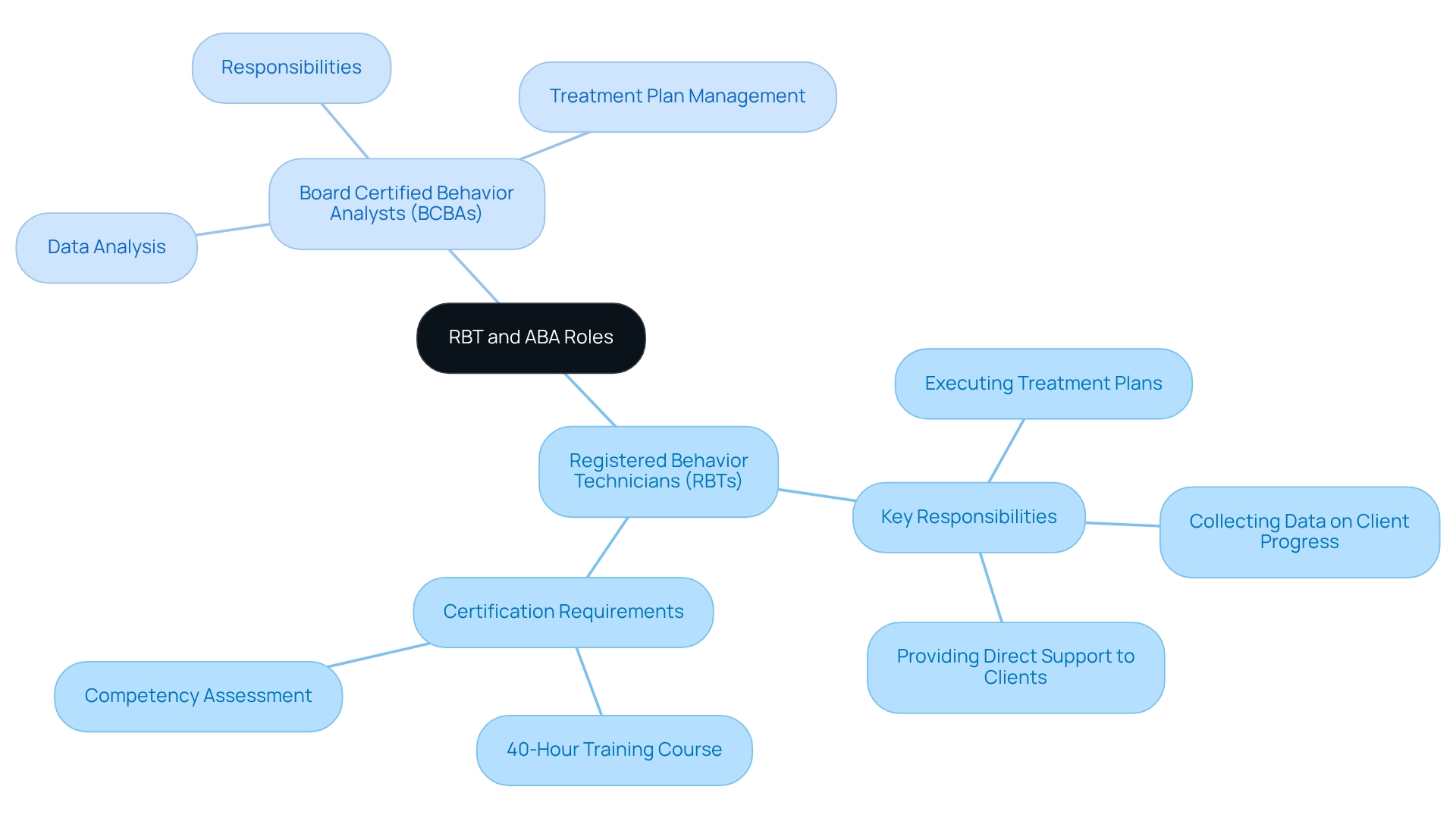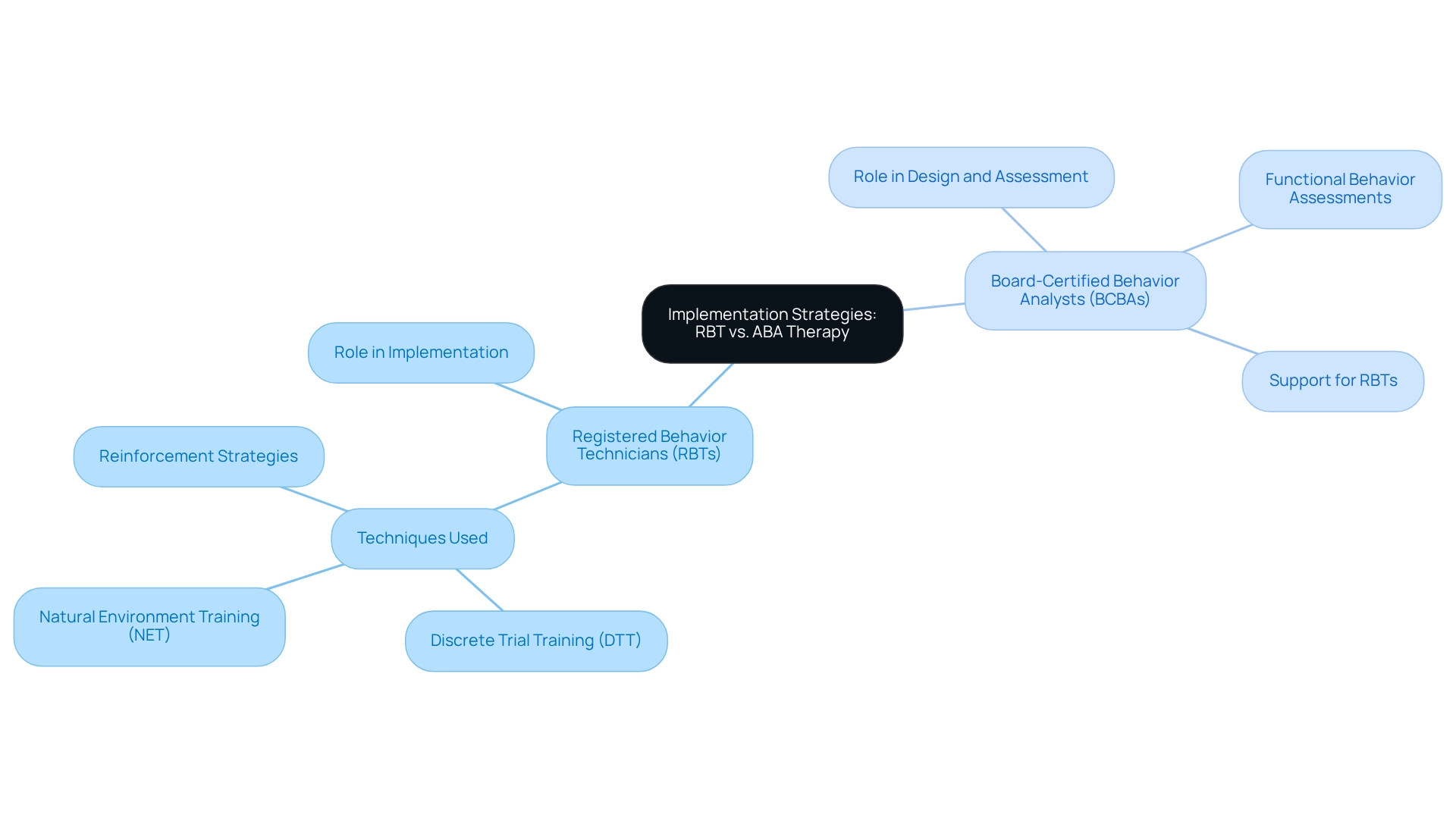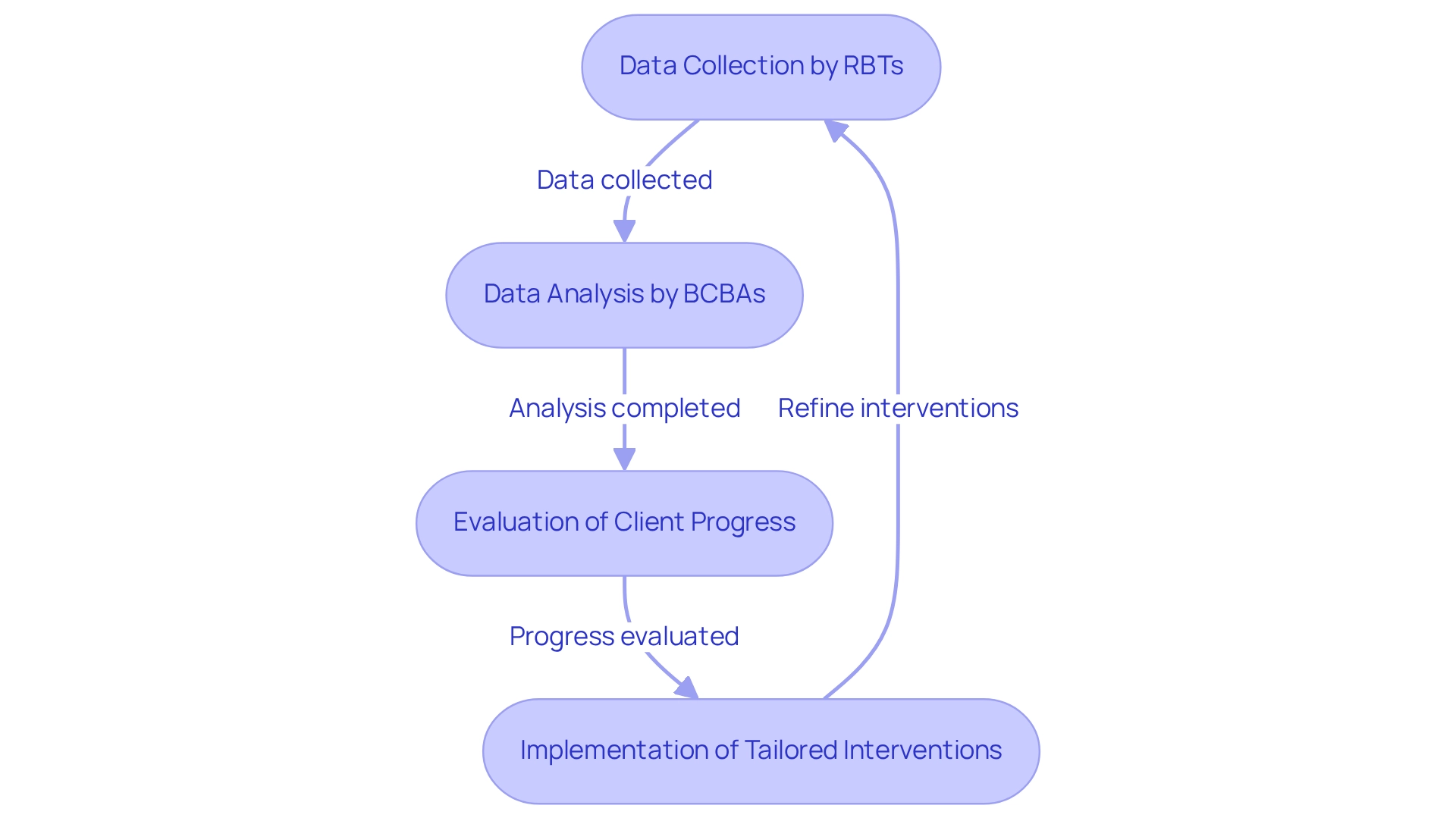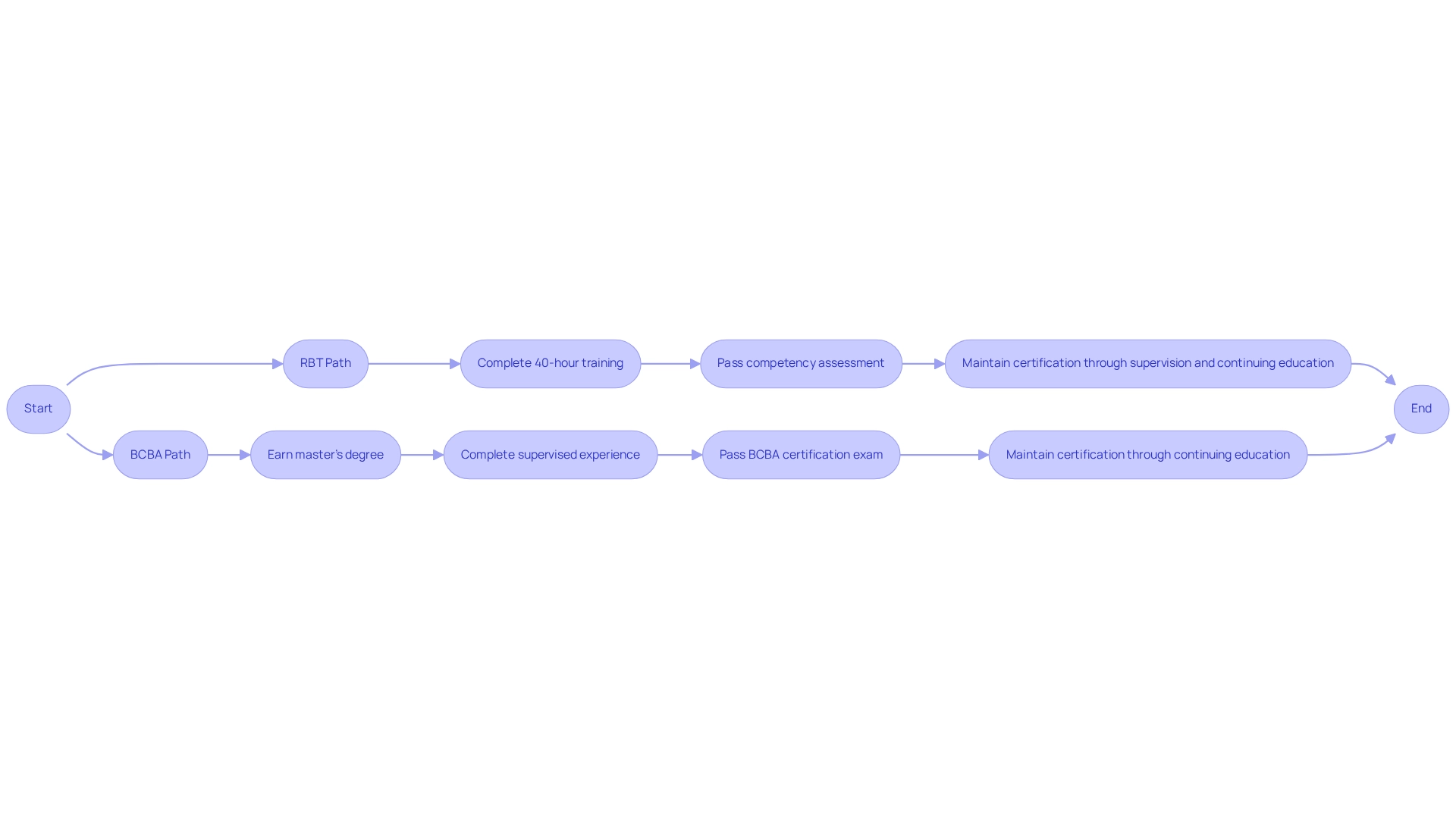Overview
This article explores the important roles of Registered Behavior Technicians (RBTs) and Applied Behavior Analysis (ABA), shedding light on their unique responsibilities and the outcomes each approach can achieve. It highlights the essential collaboration between RBTs and Board Certified Behavior Analysts (BCBAs), emphasizing that this partnership is vital for effective therapy outcomes. Parents can take comfort in knowing that the success of therapy is often reflected in data showing client progress and skill acquisition. Understanding these dynamics can empower families in their journey towards supporting their loved ones.
Introduction
In the realm of behavior analysis, the collaboration between Registered Behavior Technicians (RBTs) and Board Certified Behavior Analysts (BCBAs) is essential for delivering effective therapeutic interventions. RBTs focus on the hands-on implementation of treatment plans, while BCBAs are responsible for designing and evaluating these strategies based on thorough assessments. This article explores the distinct roles and responsibilities of RBTs and BCBAs, shedding light on their approaches to therapy, the effectiveness of their methods, and the educational pathways that lead to these vital careers in Applied Behavior Analysis (ABA).
Understanding these dynamics is crucial for appreciating how therapy is tailored to meet individual client needs and foster meaningful progress. We invite you to join us on this journey of discovery, as we delve deeper into how these professionals work together to create positive change.
Define RBT and ABA: Roles and Responsibilities
Registered Behavior Technicians (RBTs) play a vital role in supporting children and families, acting as paraprofessionals who implement analysis services under the guidance of a Board Certified Behavior Analyst (BCBA). Their key responsibilities include:
- Executing treatment plans
- Collecting data on client progress
- Providing direct support to clients
To become certified, RBTs must complete a 40-hour training course and pass a competency assessment, ensuring they are well-prepared to assist those in need.
On the other hand, Applied Behavior Analysis (ABA) represents a scientific approach to understanding and modifying behavior, which can be a source of hope for many families. ABA professionals, particularly board-certified analysts, are responsible for creating and managing treatment plans based on thorough behavioral evaluations. They analyze the data collected by behavior technicians to make informed decisions about the effectiveness of interventions, adjusting strategies as needed to ensure the best outcomes for their clients.
Understanding the distinct roles, especially when considering RBT vs ABA, is crucial for parents and caregivers as they navigate the therapy process involving Board Certified Behavior Analysts who typically hold a master's degree in behavior analysis or a related field, along with guided experience and certification from the Behavior Analyst Certification Board (BACB). By recognizing the support offered by RBTs and the strategic oversight provided by BCBAs, families can feel more empowered and informed about the journey ahead. If you have questions or need guidance, don’t hesitate to reach out to professionals in the field who can provide the support you need.

Compare Implementation Strategies: RBT vs. ABA Therapy
Registered Behavior Technicians (RBTs) play a vital role in the direct implementation of intervention strategies crafted by Board-Certified Behavior Analysts (BCBAs). They employ techniques such as:
- Discrete trial training (DTT)
- Natural environment training (NET)
- Reinforcement strategies
to foster positive behavior changes in a nurturing environment. RBTs are trained to adhere to specific protocols, ensuring that treatment plans are followed with fidelity and consistency, which is crucial for effective outcomes.
On the other hand, board-certified behavior analysts take on the important responsibility of designing and assessing these comprehensive treatment plans. They conduct functional behavior assessments to uncover the underlying causes of behaviors, tailoring interventions to meet individual needs. Moreover, behavior analysts provide ongoing support and guidance to registered behavior technicians, especially when discussing RBT vs ABA, ensuring that the execution of strategies aligns with the best practices in Applied Behavior Analysis (ABA). This collaborative approach not only enhances the effectiveness of therapy but also creates a supportive atmosphere where RBTs can confidently apply the strategies while BCBA oversight ensures adjustments are made based on careful data analysis. Together, they create a nurturing environment that promotes growth and development.

Evaluate Effectiveness: Outcomes of RBT and ABA Approaches
The discussion of rbt vs aba highlights the pivotal role of Registered Behavior Technicians (RBTs) in implementing Applied Behavior Analysis (ABA) strategies, often reflected in the progress of clients. This progress is measured by data on behavioral improvements and skill acquisition, which RBTs diligently collect. Behavior Analysts then analyze this data to gauge the success of interventions.
When RBTs are well-trained and receive appropriate oversight, clients often show remarkable advancements in essential skills, such as communication and social interactions. This nurturing approach is vital in supporting the growth of individuals with unique needs, and when examining the overall effectiveness of ABA therapy, the comparison of rbt vs aba highlights the collaborative efforts of both RBTs and Board-Certified Behavior Analysts (BCBAs), which is backed by extensive research.
This research illustrates ABA's efficacy in addressing autism spectrum disorder (ASD) and other developmental challenges. Studies indicate that ABA therapy can lead to significant improvements in adaptive functioning and a decrease in problematic behaviors. The partnership between RBTs and BCBAs is crucial in achieving these positive outcomes, as they ensure that interventions are tailored to meet the individual needs of clients and are continuously refined based on data. Together, they create a supportive environment that fosters growth and development.

Explore Career Paths: Education and Certification for RBTs and BCBAs
For those passionate about helping others, understanding the differences between RBT vs ABA is a significant step in becoming a Registered Behavior Technician. It begins with a comprehensive 40-hour training course that delves into the principles of Applied Behavior Analysis (ABA), ethics, and the responsibilities that come with this rewarding role. After completing the training, candidates must pass a competency assessment to earn their certification from the Behavior Analyst Certification Board (BACB). It's important to note that RBTs must also maintain their certification through ongoing supervision and continuing education, ensuring they stay current and effective in their practice.
On the other hand, Board Certified Behavior Analysts (BCBAs) embark on a more extensive journey. They are required to hold a master's degree in behavior analysis or a related field, complete supervised experience hours, and successfully pass the BCBA certification exam. This rigorous process is designed to ensure that behavior analysts possess the essential knowledge and skills needed to design and oversee effective ABA interventions, particularly in the context of rbt vs aba. Furthermore, BCBAs must engage in continuing education to maintain their certification, reflecting the ever-evolving nature of this vital field. The educational and certification pathways for both roles in rbt vs aba therapy underscore the dedication and commitment required to excel in the profession.
If you’re considering a career in this field, know that every step you take is a step towards making a meaningful difference in the lives of individuals and families. Your journey is important, and there are resources available to support you along the way.

Conclusion
The collaboration between Registered Behavior Technicians (RBTs) and Board Certified Behavior Analysts (BCBAs) is fundamental to the success of therapeutic interventions in Applied Behavior Analysis (ABA). RBTs execute treatment plans and provide direct client support, while BCBAs design these plans and analyze their effectiveness. This clear delineation of roles ensures that therapy is not only implemented correctly but also continuously refined based on data-driven insights.
The effectiveness of ABA therapy relies heavily on the synergy between RBTs and BCBAs. RBTs play a pivotal role in collecting data on client progress, which BCBAs utilize to assess and adjust treatment strategies. Research supports the efficacy of this collaborative approach, demonstrating significant improvements in clients’ behaviors and skills when interventions are tailored to individual needs. The commitment to ongoing training and supervision further enhances the quality of care provided.
Understanding the distinct yet complementary roles of RBTs and BCBAs is crucial for appreciating the complexities of ABA therapy. Their partnership not only fosters positive outcomes for clients but also underscores the importance of a well-structured educational and certification pathway in shaping skilled professionals in the field. As the demand for effective behavioral interventions continues to grow, the collaboration between these two roles will remain essential in delivering high-quality therapy tailored to those in need.
We encourage parents and caregivers to recognize the importance of this collaboration and to seek out resources that can support their journey. By understanding the roles of RBTs and BCBAs, you can better advocate for the needs of your loved ones and contribute to their success in therapy.
Frequently Asked Questions
What is the role of Registered Behavior Technicians (RBTs)?
RBTs play a vital role in supporting children and families by implementing analysis services under the guidance of a Board Certified Behavior Analyst (BCBA). Their key responsibilities include executing treatment plans, collecting data on client progress, and providing direct support to clients.
What are the requirements to become a certified RBT?
To become certified, RBTs must complete a 40-hour training course and pass a competency assessment.
What is Applied Behavior Analysis (ABA)?
ABA is a scientific approach to understanding and modifying behavior. It involves creating and managing treatment plans based on thorough behavioral evaluations.
What is the role of Board Certified Behavior Analysts (BCBAs)?
BCBAs are responsible for creating and managing treatment plans and analyzing the data collected by behavior technicians to make informed decisions about the effectiveness of interventions.
Why is it important for parents and caregivers to understand the roles of RBTs and BCBAs?
Understanding the distinct roles of RBTs and BCBAs is crucial for parents and caregivers as they navigate the therapy process. This knowledge empowers families and helps them feel informed about the support and strategic oversight available to them.
What qualifications do BCBAs typically have?
BCBAs typically hold a master’s degree in behavior analysis or a related field, along with guided experience and certification from the Behavior Analyst Certification Board (BACB).




